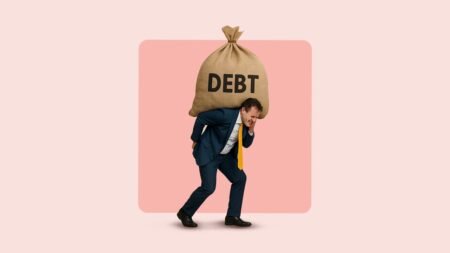Photography by Getty Images; Illustration by Bankrate
Key takeaways
- Debt management is a systematic way to pay off your debts, either on your own or with the help of a professional debt management company.
- Debt management companies are skilled at negotiating on your behalf, often finding ways to lower payments or reduce your interest rate.
- A debt management plan can negatively impact your credit score at first, but your score can improve over time with responsible financial habits.
In the second half of 2024, the average consumer’s credit card debt was $6,730, according to Experian’s consumer debt study, and just over $19,000 for personal loans. Between late fees, variable interest rates and lifestyle changes, it’s easy to get stuck in an unwanted financial situation.
You don’t have to face your debt alone. Strategies and resources are available to help alleviate your payments and guide you out of this predicament. This can be done through debt management, a process of planning and organizing how you’ll pay off your debt. This is typically accomplished by creating a debt management plan (DMP), which outlines your outstanding balances and how they will be eliminated.
Did you know?
Bankrate’s debt paydown calculator can help build your debt payment plan by prioritizing your debts for you and creating a pay-down schedule that breaks down every debt into specific monthly payments.
Debt management vs. debt settlement: What’s the difference?
They may sound similar, but debt management and debt settlement are two different financial tools.
Debt management
Debt management is a structured way of organizing your debt and payments into a more manageable repayment plan that allows you to become debt-free, usually within a few years, without impacting your credit too much in the long run. You can create a DMP by yourself or through credit counseling, which includes a small fee.
Debt settlement
Debt settlement is the process of negotiating with creditors to reduce the amount you owe and paying it off in one lump sum. While it may sound quick and easy, it involves a lot of work and may take years to accomplish.
It is also incredibly risky. It will damage your credit score and could drive you further into debt. And if you work with a debt relief company to help with negotiations, you may have to pay a fee of up to 25 percent of the settled amount.
How does a debt management plan work?
The debt management process will require a debt management plan (DMP). A good DMP will likely include:
- Prioritizing debt payments
- Negotiating lower payments or interest rates with lenders
- Working with creditors to reduce your debt, pause your interest charges or waive late fees
Most DMPs are completed through one of two methods:
1. DIY debt management
A do-it-yourself (DIY) plan is one you create and execute on your own. You’ll review your budget and see how much you can contribute toward your outstanding balances. You’ll want to be able to pay all of your minimum debt payments, then apply any extra money toward the debt you prioritize paying off first.
To choose which debt to prioritize, use one of the following methods:
- Debt snowball: Prioritize debts with the lowest balance. You’ll make extra payments toward this debt while paying the minimum amount on the rest.
- Debt avalanche: Prioritize debts with the highest interest rate and make extra payments toward this debt first while paying the minimum amount on the rest.
Is DIY debt management the right option for you?
- Best for: Those who struggle with overspending but can afford to make monthly debt payments by being more disciplined.
- Biggest advantages: You can protect your credit rating by making timely monthly payments and paying in full. A realistic plan with milestones and a debt-payoff date can keep you motivated.
- Biggest disadvantages: You won’t have insight from a professional who may have more effective strategies to get out of debt faster. Furthermore, creditors may not be open to negotiations.
2. Debt management with a credit counselor
In this debt management method, a credit counselor uses their expertise to construct a debt management plan, negotiate with lenders on your behalf and lay out a payment schedule to get you debt-free over the next three to five years. They do much of the planning, negotiating and payment distribution for you. Typically, you’ll make a single monthly payment to the agency each month, which it then distributes to your creditors.
You can find a credit counselor through the National Foundation of Credit Counselors. Note that there are both nonprofit and for-profit credit counselors. Before partnering with one, read reviews and understand any fees involved. You may also want to try negotiating with lenders and creditors on your own to lower your rates or payments. This will require extra work and may be more difficult to do on your own and may be easier to do through a company with experience and connections.
Is credit counseling the right option for you?
- Best for: Those who want professional help managing their finances and credit score.
- Biggest advantages: Credit counselors have experience negotiating with creditors and may have more strategies for paying off your debt. Plus, they do a lot of the frustrating work for you.
- Biggest disadvantages: You may not have access to your credit accounts. Plus, you’ll need to relinquish control of your debts to the counseling agency. You’ll probably pay a fee for the agency’s services.
Pros and cons of debt management plans
A DMP is not a one-size-fits-all solution, and won’t typically include secured debts, like auto loans or mortgages. It’s important to make sure this financial tool fits in with the big picture of your debt payoff.
Pros
- You’ll feel less stressed and overwhelmed knowing you have a plan.
- You’ll have a payoff date to work toward.
- You could negotiate lower rates and waived fees.
- Payments will feel more manageable.
- You’ll develop healthy financial habits throughout your plan.
Cons
- It may cost additional money if you use a service.
- You can’t include all debts in your plan.
- It may take years to complete the debt management plan.
- You may not have access to credit and may have to close some accounts.
- Some creditors may not be willing to negotiate.
Alternatives to debt management plans
While a DMP has its benefits, it may not be the best fit for all occasions. The following are some other approaches for managing your debt:
- Balance transfer credit cards: Moves your outstanding balance from one credit card to another. However, the new credit card will have a 0 percent APR for the next six to 18 months, allowing you to pay it down without interest accumulation.
- Debt consolidation loan: A loan gives you a lump sum of money you can use to pay off your current outstanding balances. This arrangement works great if the consolidation loan has a lower overall APR than the average of your other debts. However, it’s a new loan you will legally be obligated to repay.
- Bankruptcy: This is a last resort option where the courts relieve your debt obligations. However, if you enter Chapter 7 bankruptcy, it can also include the relinquishing or selling of non-protected assets such as your home or vehicle. Chapter 13 bankruptcy allows you to keep your assets and may have a longer repayment process.
Bankrate’s take:
Both Chapter 7 and 13 bankruptcies can destroy your credit. You should always speak to an attorney or financial advisor to understand the potential repercussions before taking this route.
Bottom line
It doesn’t have to feel like you’ll never get out of debt. A debt management plan can help lay the groundwork for paying down your debt and could even save you money in the long run.
Whether you decide to work alone or with the help of an external service, what’s important is that you take action. Consider each approach’s potential advantages and disadvantages and choose the one that works best for your financial situation.
Frequently asked questions
Read the full article here

















